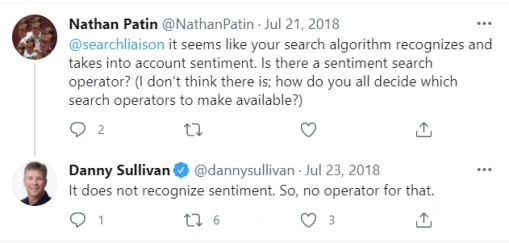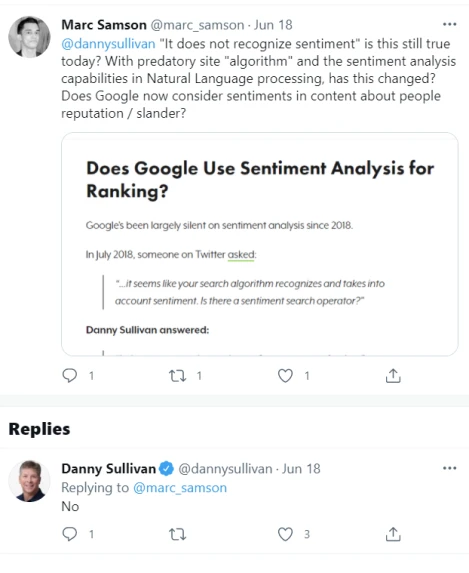Back in 2018, Google’s Danny Sullivan explained that they don’t use online sentiment analysis for any type of ranking purposes.
This has somehow become a point of confusion in recent years, but Google has— on multiple occasions—explained that sentiment analysis is not a part of their ranking algorithm.

The question came up on Twitter again quite recently, where it was asked whether or not Google uses sentiment analysis for search ranking:

The question was whether or not it was still true today, and Danny replied that no, Google currently does not use sentiment analysis for ranking reasons.
What is Online Sentiment?
Online sentiment, in nontechnical terms, refers to emotions people feel when they engage with a brand, service, or product. Whenever someone mentions a company or individual online, it’s usually always driven by emotion in some way.
The goal of online sentiment is to understand human emotion through text- by utilizing natural language processing and text analysis to understand emotion in online text via mechanical means.
Basically, if SEO practitioners can crack online sentiment analysis, it would add yet another dimension of measurement, and would allow them to better understand what searchers are really searching for and why—via their emotion triggers.
The Importance of Online Sentiment Analysis
While Google may not use it in their search algorithms that we know of, using online sentiment analysis in other ways can be a key to unlocking and understanding customer satisfaction. This results in more informed business choices along with figuring out exactly what makes the targeted audience tick.
It makes sense that we may be working on identifying whether or not Google uses online sentiment analysis as part of their algorithm, because this unlocks a mountain of knowledge for us as SEOs also.
Accurate measurement of online sentiment analysis would help to improve the following when it comes to customer acquisition and satisfaction:
More accurately assessing customer satisfaction: Analyzing online sentiment would allow companies to better understand how customers feel about their product, brand, and service ecosystem online.
Work to increase loyalty of your customers: By identifying positive and negative online sentiments regarding your company, it’s possible to figure out exactly what makes your customer happy or angry at you.
When you have this information, you can tweak your marketing campaigns to match the potential attitudes of your customers, which will help pay dividends towards overall tweaks to your big-picture campaigns.
Why is All of This Important?
The more information and knowledge you have about your customers, the better and more targeted your SEO campaigns will be.
This predictive knowledge is powerful, and would allow companies and individuals alike to wield significant and powerful influence over how their overall brand is perceived online.
Should Google implement some sort of online sentiment analysis? Yeah, it would add another degree of complexity to online marketing campaigns.
But doing so would add significant bias to the SERPs, and Google is a company that prefers to stay away from anything that would add significant bias.
Why All the Hoopla Surrounding Online Sentiment?
Despite evidence to the contrary, there are many SEO pros who still believe that Google does use online sentiment when it comes to rankings.
In recent years, the claim continues to be perpetuated. We don’t think this is an accurate claim, because of the fact that adding bias is something that Google has expressed repeatedly that they want to avoid.
Bill Slawski has said the following regarding online sentiment:
“Sentiment is like a flavor, like vanilla or chocolate. It does not reflect the potential information gain that an article might bring.
Information gain can be understood by using NLP processing to extract entities and knowledge about them, and that can lead to a determination of information gain.
Sentiment is a value that doesn’t necessarily reflect how much information an article might bring to a topic.
Positive or negative sentiment is not a reflection of how much knowledge is present and added to a topic.
I don’t believe that Google would favor one sentiment over another. That smells of showing potential bias on a topic.
I would expect Google to want some amount of diversity when it comes to sentiment, so if they were considering ranking based upon it, they would not show all negative or positive.”
Much furor has arisen in recent years from an unnamed political party regarding bias in Google search and how it favors certain political biases over another.
First, such bias would be impossible, and would require online sentiment to be an active element in Google’s search ranking algorithms.
Second, Google has repeatedly rejected this claim, explaining that results are showing up purely based on how people search, rather than a specific bias.
If Google were to use online sentiment in their algorithm, they would be providing significantly-biased SERPs as a result.
We don’t think that Google would want to make their SERPs appear biased, which is likely why they have steadfastly denied the online sentiment claim.
Because of this, this is something that we believe does not currently exist in the algorithm. Google has been pretty consistent on this as well.
Where Could Online Sentiment Be Used?
Earlier in 2018, Danny Sullivan did publish the following official Google announcement regarding featured snippets:
“…people who search for “are reptiles good pets” should get the same featured snippet as “are reptiles bad pets” since they are seeking the same information: how do reptiles rate as pets? However, the featured snippets we serve contradict each other.
A page arguing that reptiles are good pets seems the best match for people who search about them being good. Similarly, a page arguing that reptiles are bad pets seems the best match for people who search about them being bad. We’re exploring solutions to this challenge, including showing multiple responses.”
This is likely where some SEOs have seen the idea that Google uses online sentiment, and have misattributed online sentiment to mean that Google uses it all the time.
Since then, there is no current evidence that Google uses online sentiment significantly.
Sorry SEOs—Online Sentiment Does Not Exist Yet
Inasmuch as online sentiment would be an awesome thing to point to your friends and say “See? I was right!,” we think that including online sentiment would lead to heavy SERP bias, something that Google wants to avoid.
Do we want to see more concrete factors we can take advantage of to increase a site’s rankings? Absolutely. But something like bias also appears to be something that would be too easy to game.
Think about it. If it came out that a certain SERP was heavily biased towards positive sentiment regarding several brands, then just about everyone would be taking advantage of that sentiment to consistently optimize for it.
But, online sentiment could be quite valuable when it comes to tweaking your overall marketing campaigns.
Alas, however, Google does not currently utilize online sentiment in their ranking algorithms, which we feel is a good thing. Because of such bias and other issues that it could introduce into the SERPs.
We think that online sentiment in the SERPs would be a step in the wrong direction.









